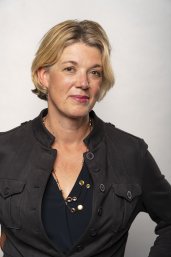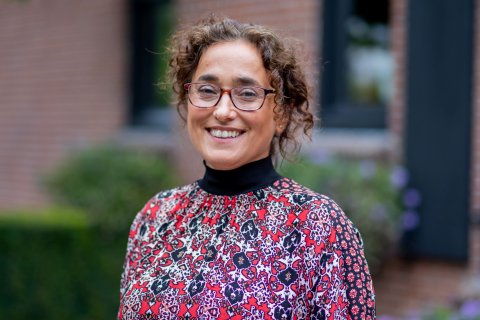‘Diversity requires an integral approach’
On 6 October 2020, Day of Diversity, the Steering Committee of the programme Equality, Diversity & Inclusion (EDI) presented a new strategic action plan. Where does the university stand now in the field of diversity and inclusion, and which goals are central for the upcoming years? Programme Manager Brigitte Prieshof and Associate Professor of Biomedical Sciences and EDI Steering Committee member Gönül Dilaver take stock. “The Black Lives Matter movement is an important catalyst.”

The EDI Office, the successor of the Diversity and Inclusion Task Force, aims to create more awareness on diversity and inclusion at Utrecht University, so all students and employees can feel at home and appreciated. “The Task Force was founded in 2017 to focus attention on the theme of diversity at the university. That worked,” says Brigitte Prieshof. “With the new EDI Steering Committee, presided over by Diversity Dean Janneke Plantenga, and the EDI programme, we want to increase the effectiveness and visibility of the policy. We encourage and fund projects and work on awareness with training programmes, among other things. We also want to make the importance of equality, diversity and inclusion within and outside the university more visible, so it will be etched into all students and employees' memories.”
Integral approach
All faculties and departments of the university are represented in the EDI Steering Committee, which also involves them in the programme. “That embedding is important for a structural securing of the programme,” says Gönül Dilaver, who is also the president of the Platform Diversity and Inclusion at the Faculty of Medicine. “There are three levels we need to work on: fixing the numbers, as in with attention for sufficient diversity among students and employees, fixing the knowledge, making employees and students aware of how important diversity is, wherever you work. And the third level: fixing the institution, so the university becomes sensitive to diversity and inclusion, so people feel at home and continue to do so. If you don't work on all three levels, a diversity policy is pointless.”
“Soon, a survey under the slogan I belong @UU will be sent to all 30,000 UU students. We want to know if and to which degree they feel at home at the university. We expect to be done gathering data by the end of 2020, so we can use the first quarter of 2021 to analyse it. We will divide the data by faculty and, if the data allows for it, even by degree programme. We expect there will be many differences between the degree programmes.”
When I started working at UU, no more than nine percent of the professors were women. We made goal-oriented policies for that.
What makes the programme and the theme of diversity so important to all of you?
Brigitte: “From a young age, I already thought diversity was very important. In my previous position at the Faculty of Science, I worked on gender equality too. Back when I started there, no more than nine percent of the professors were women. We made goal-oriented policies for that. I was also involved in the founding of the Female Professors Network of the university.” Gönül: “As a daughter of first-generation migrants, I'm very aware of the importance of inclusion. I know more than anybody else how important education is and what it can mean to someone's life. The EDI Steering Committee stands for an integral approach of diversity. It starts with a more diverse intake of students. But inclusion is not an automatic result of that. That's why it's at least as important to keep working on an inclusive education environment, in which all students feel at home and accepted. Besides that, more knowledge on the subject is required. It's still not always observed that diversity opens new perspectives on existing issues, and that this can be valuable for the improvement of the quality of research and education.”

Black Lives Matter
If you look at the activities until now, what left the biggest impression on you?
Brigitte: “I thought it was fantastic how last year, students of Studying without Limitations with wheelchairs visited many UU buildings to see if it was possible for physically disabled students to enter the buildings. This contributes to the choices that improve the accessibility of buildings.”
“Past summer, I was also really touched by the massive Black Lives Matter demonstration in Utrecht. It brought a lot about. At the EDI Office, we now receive many emails from students and employees asking how they can contribute to activities against discrimination at the university.” Gönül: “The Black Lives Matter movement has indeed worked as a catalyst. At Medicine, we worked with students to found our own students' platform for diversity and inclusion because of that. When the platform was announced, it had about one hundred applications in no time.”
“I see that people are already more open to a conversation about discrimination. Unconscious biases have become discussable too. That's very good, because people often don't discriminate knowingly. They don't notice themselves that they hurt someone with an insensitive remark. The Black Lives Matter movement has seen to it that people now dare to say out loud that unintentional discrimination can hurt too.”
I see that people are already more open to a conversation about discrimination. Unconscious biases have become discussable too.
What does diversity mean to you personally?
Gönül: “Diversity means to me that regardless of origin, colour, sexual inclination and social status, you have equal opportunities and are treated equally. And that you accept everyone as they are. Diversity is important from the perspective of equality and justice, and awareness of it is necessary in order to function properly in our global society.” Brigitte: “That's completely true. Besides that, the importance of diversity to me is that it challenges you to think about questions and perspectives you never thought about before. The main thing is this: no diversity without inclusion. People have to dare and be able to speak up.”
This article appeared earlier in Pandora magazine in Dutch and is written by Elisa Veini.
The five objectives 2021-2025 and examples of actions are:
- Increasing awareness with regard to equality, diversity and inclusion within and outside the university.
- Actively supporting and promoting equality, diversity and inclusion.
- Making employees and students feel welcome and valued at the university.
- Stimulating an inclusive, open and safe learning and working environment.
- Monitoring the progress of these actions.

